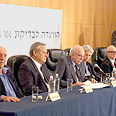
The Winograd reality show
News coverage aims to entertain viewers instead of offering serious public debate
The reports and headlines of the past two weeks again demonstrate how the manner in which Israel's news media cover political events increasingly resembles reality shows rather than a serious, in depth analysis.
One of the main attractions in shows such as "Survivor" and "Big Brother" are the personal clashes between competitors. Both in political news and in reality shows we see several mechanisms that ensure the ongoing flow of insults and attacks. Both genres are edited in a manner that grants personal clashes the most attention, particularly if these attacks are caught on camera.
In addition, in these genres, participants are actively encouraged to condemn other competitors. The most dramatic political stories take place when a group of ministers or Knesset members (who are often branded as "rebels") secretly conspire against the prime minister, in a bid to topple him. Daily news items focus on strategies, media "spins," behind the scenes "conspiracies," and backstabbing.
The component that is sorely missing when it comes to political news coverage is a debate on policy and institutions. The Winograd interim report points to fundamental failures in the decision-making process, both within the political leadership and in the IDF. These failures constitute genuine danger to the country's future. Yet many of the problems that emerged in the report existed a long time before Ehud Olmert was elected as prime minister, and they are likely to persist even after he ends his term in office.
Despite this, the main motive in the news coverage was that the solution to the problems that emerged from the report hinges on the resignation of Olmert and Peretz. Just like in a reality show, it appears that all we need to do in order to take care of everything is to kick out the "failures" from the show. Yet one of the ironies inherent in modern public discourse is that the most important problems faced by the country are too complex, and possibly too boring, for primetime coverage.
No heroes in politics
Of course, the political reality show also has judges, or in the news people's language: Commentators. Their job is to provide the audience with expert opinion on the following question: Who provides the best show? The most popular commentators are those that present the cruelest and most cynical analysis. The road to journalist heaven, so it seems, is paved with bad intentions.
It was only a matter of time before the "clean and pure" Tzipi Livni would be butchered by the judges. Her press conference ("Olmert should resign, but I shouldn't") constituted a golden opportunity for them. It appears that everyone can agree that the most sarcastic articles about her appearance were also the most memorable - "she proved she can serve as the head of Na'amat" (the Movement of Working Women and Volunteers.)
In the news, just like in reality shows, Israeli viewers send instant messages in the form of polls that are published in the media several times a week. As opposed to reality shows, the first question they ask here is as follows: Who should be kicked off the show ("Do you think Olmert and Peretz should resign?") On the other hand, Israeli politicians enjoy a "lifesaver" so that they can be reelected and return to the game after they were dismissed.
This brings us to the most significant difference between political news and reality shows: while the latter feature heroes, villains, and idiots, when it comes to political news it is difficult to find heroes. Some will say that Judge Winograd himself is a type of hero – after the report was presented, one journalist wrote that a "Star is Born" (the name of the Israeli version of "American Idol.") Yet this is the exception; the judge and commission he headed have ceased being a major part of the story a long time ago.
The genuine drama is supplied by a regular stream of cynical news that present three types of politicians in Israel: Fools, liars, and chickens. The only way a political leader can be portrayed in a positive light is if he is not in office or is no longer alive. It is amazing that there would be even one citizen who still believes in the political system.
More than 20 years ago, Neil Postman wrote a book called "Amusing Ourselves to Death: Public Discourse in the Age of Show Business." The main message was that in the modern era, the entire format of public discourse in the media is adjusted to show business. The danger this trend poses to all Western democracies is even more apparent today.
When the news focus more on an attempt to amuse and less on the desire to inform, even the most involved citizens will find it difficult to develop intelligent comprehension of the major challenges faced by the country.
The writer is a political science and communication professor at Hebrew University










